Top Rankings
Azusa Unified School District ranks among the top 20% of public school district in California for:
Category
Attribute
Community Size
Largest student body (number of students) (Top 1%)
For the 2025 school year, there is 1 public preschool in Azusa Unified School District.
Overview
This School District
This State (CA)
# Schools
11 Schools
47 Schools
# Students
6,352 Students
20,115 Students
# Teachers
288 Teachers
630 Teachers
Student : Teacher Ratio
22:1
22:1
District Rank
Azusa Unified School District, which is ranked #1240 of all 1,925 school districts in California (based off of combined math and reading proficiency testing data) for the 2021-2022 school year.
The school district's graduation rate of 87% has decreased from 88% over five school years.
Overall District Rank
#1162 out of 1941 school districts
(Bottom 50%)
(Bottom 50%)
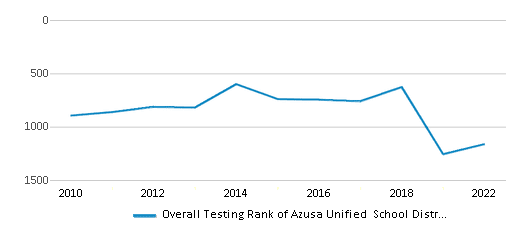
Math Test Scores (% Proficient)
23%
33%
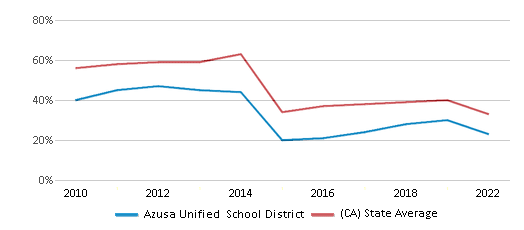
Reading/Language Arts Test Scores (% Proficient)
37%
47%
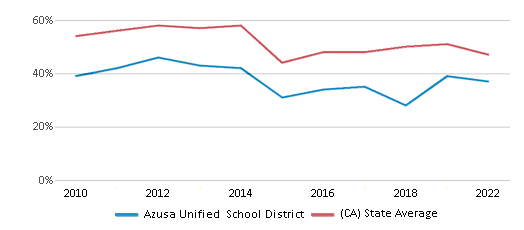
Science Test Scores (% Proficient)
18%
29%
Graduation Rate
87%
87%
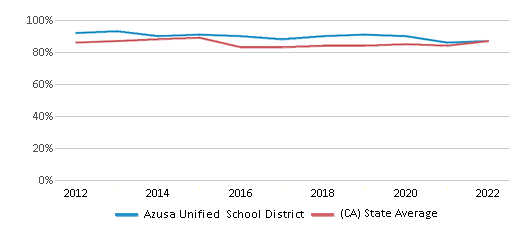
Students by Ethnicity:
Diversity Score
0.17
0.74
# American Indian Students
5 Students
154 Students
% American Indian Students
n/a
2%
# Asian Students
183 Students
1,257 Students
% Asian Students
3%
7%
# Hispanic Students
5,774 Students
8,807 Students
% Hispanic Students
91%
44%
# Black Students
62 Students
2,351 Students
% Black Students
1%
12%
# White Students
190 Students
4,154 Students
% White Students
3%
21%
# Hawaiian Students
2 Students
171 Students
% Hawaiian Students
n/a
2%
# Two or more races Students
134 Students
643 Students
% of Two or more races Students
2%
4%
Students by Grade:
# Students in PK Grade:
-
18
# Students in K Grade:
648
4,410
# Students in 1st Grade:
498
1,274
# Students in 2nd Grade:
469
1,228
# Students in 3rd Grade:
498
1,320
# Students in 4th Grade:
457
1,316
# Students in 5th Grade:
518
1,281
# Students in 6th Grade:
446
1,267
# Students in 7th Grade:
497
1,363
# Students in 8th Grade:
477
1,444
# Students in 9th Grade:
429
1,363
# Students in 10th Grade:
444
1,386
# Students in 11th Grade:
448
1,328
# Students in 12th Grade:
523
1,117
# Ungraded Students:
-
-
District Revenue and Spending
The revenue/student of $25,122 is higher than the state median of $19,974. The school district revenue/student has grown by 8% over four school years.
The school district's spending/student of $21,062 is higher than the state median of $18,396. The school district spending/student has grown by 8% over four school years.
Total Revenue
$160 MM
$116,387 MM
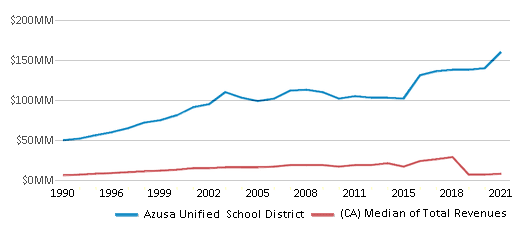
Spending
$134 MM
$107,188 MM
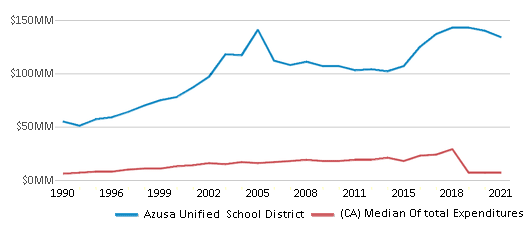
Revenue / Student
$25,122
$19,974
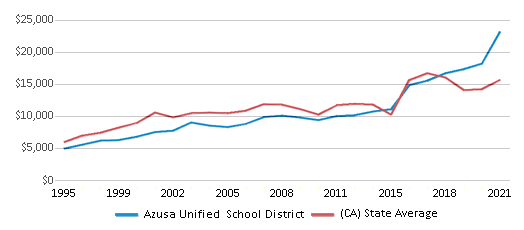
Spending / Student
$21,062
$18,396
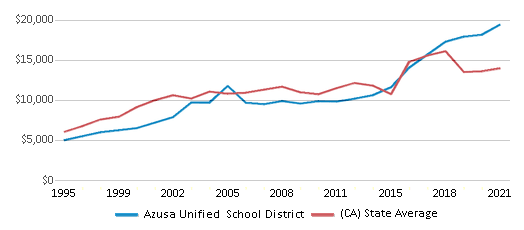
Best Azusa Unified School District Public Preschools (2025)
School
(Math and Reading Proficiency)
(Math and Reading Proficiency)
Location
Grades
Students
Recent Articles

Year-Round Or Traditional Schedule?
Which is more appropriate for your child? A year-round attendance schedule or traditional schedule? We look at the pros and cons.

Why You Should Encourage Your Child to Join a Sports Team
Participating in team sports has a great many benefits for children, there is no doubt. In this article you will learn what those benefits are.

White Students are Now the Minority in U.S. Public Schools
Increasing birth rates among immigrant families from Asia and Central and South America, combined with lower birth rates among white families, means that for the first time in history, public school students in the United States are majority-minority. This shift in demographics poses difficulties for schools as they work to accommodate children of varying language abilities and socio-economic backgrounds.





